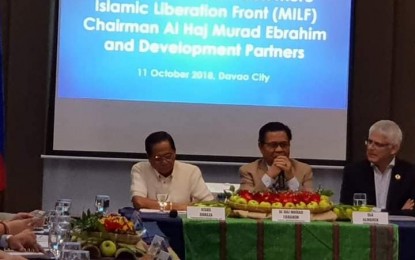
DAVAO CITY – The Moro Islamic Liberation Front (MILF) bared its ten priorities in its transition from rebellion to governance, and the transition of the Autonomous Region in Muslim Mindanao (ARMM) to the Bangsamoro Autonomous Region in Muslim Mindanao (BARMM).
In a conversation with development partners from international communities held at Davao City on Oct. 11, MILF Chairman Alhaj Murad Ebrahim unveiled the priorities that they will undertake, as follows:
1. Enact priority measures mandated by the Bangsamoro law such as Electoral Code, Civil Service Code, Administrative Code and other legislations that need to be enacted during the BTA (Bangsamoro Transition Authority);
2. Review and integrate the Bangsamoro Development Plan, the Regional Development Plan of ARMM, the Camp Transformation Plan and other Bangsamoro plans to make them responsive to the current needs;
3. Study and design the appropriate bureaucracy for the Bangsamoro Government to ensure the right balance between the size of the bureaucracy and the services that need to delivered as well as the appropriate skills required of people in the bureaucracy;
4. Set up programs that will respond to the pressing social and economic challenges in the Bangsamoro such as poverty, education, health, access to clean water and electricity, job opportunity, agricultural productivity, and access to capital market. “These must be complemented with responsive strategic infrastructure in the region such as ports, road network, flood control, and logistics and communication facilities;”
5. Special programs for transitioning combatants and their families apart from regular programs of the government like 4Ps, Philhealth, among others “to ensure that these programs are tailored fit to their needs so that they will become productive members of the society;”
6. Rehabilitation and reconstruction of Marawi. “Marawi must be quickly rehabilitated and reconstructed as every delay is an opportunity for violent extremism to use it for propaganda and recruitment. Besides, immediate rehabilitation of Marawi is both the right and just thing to do,”.
7. Develop policy environment on transparency, accountability, and prudent fiscal policy as well as improvement on revenue generation;
8. Energy development and power generation improvement to support the development of industries that will generate jobs and other opportunities;
9. Enhance security by “maximizing the utilization of available legitimate forces on the ground and leveraging on the network of the MILF in the Bangsamoro communities by deploying such joint forces such as the JPSTs (Joint Peace and Security Teams); and
10. Ensure a productive partnership between the Bangsamoro Government and Development partners as well as the national government to ensure complementation of programs to maximize results.

The event was attended by representatives of the United Nations (UN), the European Union (EU), World Bank, embassies of Australia, Brunei, Canada, Japan, Malaysia, Netherlands, Norway, Switzerland, Turkey, United Kingdom and Spain.
The MILF engaged in peace talks with the Philippine government in 1997 in quest for a lasting solution to the protracted conflict in Southern Philippines.
In 2014, the Comprehensive Agreement on the Bangsamoro (CAB) was signed by the two parties which provides the passage of the Bangsamoro Basic Law (BBL), a legislation that seeks for the establishment of the Bangsamoro autonomous government.
During the term of former President Benigno Aquino III, the 16th Philippine Congress failed to pass the BBL.
When President Rodrigo Duterte assumed the presidency, he reconstituted the Bangsamoro Transition Commission (BTC), the body tasked to draft the Bangsamoro law.
From 15, he expanded the membership of BTC to 21 that included representatives from the Moro National Liberation Front, Indigenous Peoples and Christian Settlers.
On July 23 and 24, the Senate and House of Representatives passed Republic Act 11054 or the Organic Law on the Bangsamoro Autonomous Region in Muslim Mindanao which is also known as BOL or Bangsamoro Organic Law. It was signed into law by President Duterte on July 26, 2018.
The measure also provides that the government will have to hold plebiscite 150 days after its signing into law.
Registered voters of the current ARMM, cities of Isabela and Cotabato, six municipalities of Lanao del Norte and 39 Barangays of North Cotabato will vote in the plebiscite that is set on January 21, 2019.
Article XVI of the BOL states that the law shall be deemed ratified when approved by a majority of the votes cast in a plebiscite as proclaimed by the Commission on Elections or its duly authorized officers.
The ratification of BOL will commence the transition period for the establishment of the Bangsamoro autonomous region to be facilitated by the MILF-led BTA. (PNA)
